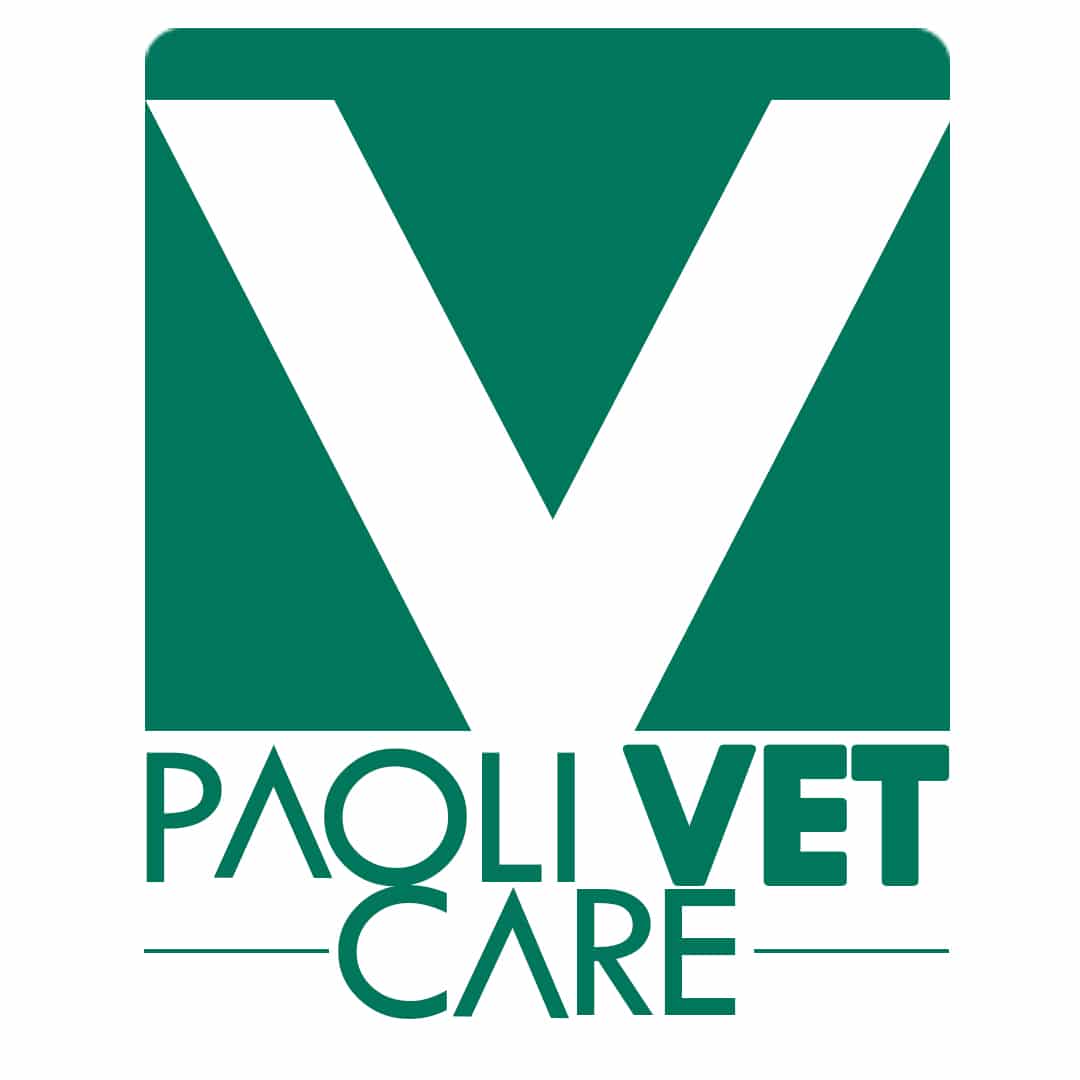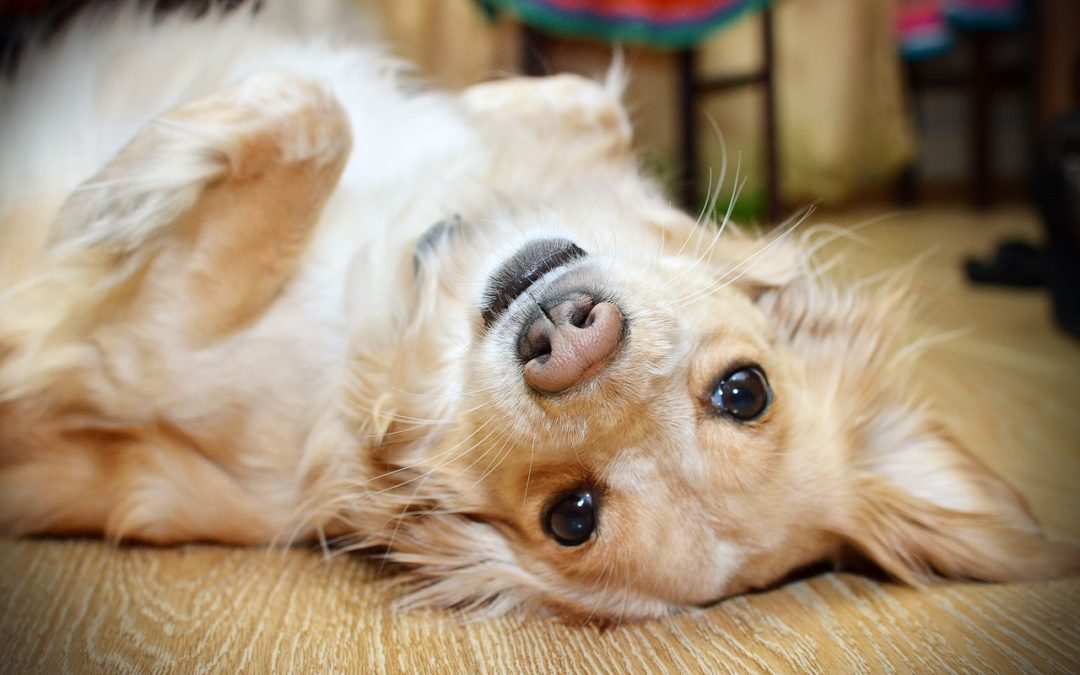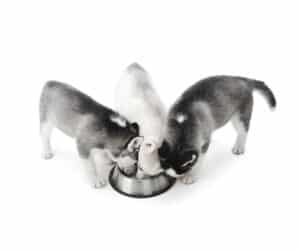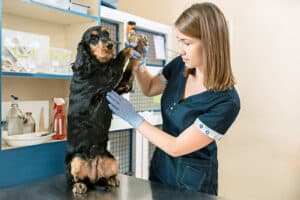At Paoli Vetcare, we believe regular checkups and wellness exams are critical to your pet’s well-being. We keep meticulous medical records and recommend further testing only when we find a potential problem in need of further investigation. Drs. Rowan and Urioste have almost 50 years of combined veterinary experience, and they proudly use that experience to ensure that your pet’s overall health and weight are properly managed.
A common question is: “What is the ideal weight for my pet?” Obesity in pets is mainly caused by overeating and a lack of exercise, however, some diseases can cause weight gain. Help your pet maintain a healthy diet, and take them out frequently for exercise and playtime.
Here are some things to look for if you think your pet might be overweight:
- Your pet has an oval shape, rather than an hourglass shape. Get a “bird’s-eye view” by standing above your pet and looking down at her. Your dog or cat should have somewhat of an hourglass shape, with a taper at the waist, which is between the abdomen and the hips. If there is little or no taper, your pet is probably overweight.
- You can’t feel your pet’s ribs. Put your hands on the side of your pet’s chest. If you can’t feel his ribs, he probably needs to lose weight. Ideally, you should be able to feel his ribs, but not see them. If you can see them, your dog or cat could be underweight.
- Extra fat around the abdomen, hips, and neck. Have you noticed a bit of a fat roll on the back side of your pup’s neck? That’s a sign that she’s carrying too much weight. Once an animal has extra fat around the abdomen, hips, and neck, it probably falls into the “obese” category and will be at higher risk of developing many health issues, including diabetes, arthritis, cancer, and more.
If you’re still unsure about your pet’s weight, please contact us! If your pet is overweight or obese, we can work with you to develop and implement an exercise and nutrition program that is right for your furry pal.
Consequences Of Pet Obesity
Table of Contents
There are many health issues and diseases that can result from pet obesity, and some of these consequences are serious. Pets with obesity have increased risk of metabolic and endocrine disorders, respiratory issues, and overall decreased quality of life. There are chronic pain issues that can result from pet obesity, such as joint inflammation and buildup of fatty tissue.
What Issues Stem From Pet Weight?
- Decreased life expectancy
- Osteoarthritis
- Diabetes
- Insulin resistance
- High blood pressure
- Kidney disease
- Respiratory disease
- Chronic pain
- Cancer
- Inflammation
Keeping pets at healthy weight levels is important to their overall health and quality of life. Obesity is one of the greatest health issues that pets commonly face, and Paoli Vetcare is happy to give you recommendations, suggestions, and medications to help curb pet obesity. It’s important to maintain your pet’s annual and biannual checkups to make sure they stay on the correct path toward health!
How to Help Your Pet Maintain an Ideal Weight
Is my dog overweight? Your pet’s weight gain or loss is entirely up to you, their owner. When you help your dog or cat reach and maintain their ideal weight, you greatly improve their quality of life. Your pet will be happier, healthier, more playful, and in a better mood.
Measure food portions
There are feeding guidelines to follow, as well as your veterinarian’s recommended portion size for your pet, but remember that you need to specifically calculate your pet’s caloric needs. Divide the amount your pet needs per day into two or three meals and feed them throughout the day to ensure they are maintaining a healthy and nutritious portion.
Adjust their diet
Is your pet’s diet appropriate? Their diet should reflect their activity level, stage of life, and health needs. You shouldn’t be feeding your adult Labrador the puppy food from 3 years ago, nor should you be pushing huge amounts of food on a new dog. It’s time to switch to an age-appropriate diet, and if you’re uncertain about what that looks like, consult with your pet’s veterinarian.
Evaluate treats
Your pet’s begging can often be insistent and annoying, and if that’s the case, feel free to give them healthier alternatives to treats filled with fat and calories. Vegetables can make excellent healthy treats for pets, and there are fresh and canned vegetables that your veterinarian can recommend. When you give your pets healthier treats, you can give them more options without exceeding their daily calorie intake.
Ditch the dish
Self-feeders might seem appropriate, but ultimately they don’t work. A bowl might be acceptable if you’re able to portion out meals all day long, but a puzzle feeder is the best option. Puzzle bowls and other food puzzle dishes encourage your pet to work for their meal and discourage consistent grazing. They also help your pet burn calories and help mentally engage them in the activity.
Increase physical activity
Pets are not given enough opportunity to play and exercise throughout the day. They require appropriate physical activity that fulfills their needs and makes them happy and healthy. Provide more interactive toys, take them on frequent walks, and play with your pet to ensure they receive proper daily exercise. If you’re worried about your overweight pet, you can gradually increase each play session’s duration and intensity over time.
Reward without food
Too often we equate food with love. Many pet owners will use food as a way to show their pets affection, but showing love in the form of tasty treats and meals will eventually harm your pet. Don’t use food to show affection—reinforce good behaviors with praise, petting, grooming, playtime, and exercise.
Conclusion
Recognizing and addressing pet obesity is important. It improves your pet’s quality of life, increases their lifespan, makes them happier, and enhances their overall well-being.
If you have any questions or concerns about diet, play, health, or other pet issues, reach out to Paoli Vetcare today. With decades of experience and a true love for pets, the veterinarians and staff at Paoli want the best life possible for your furry friends.








